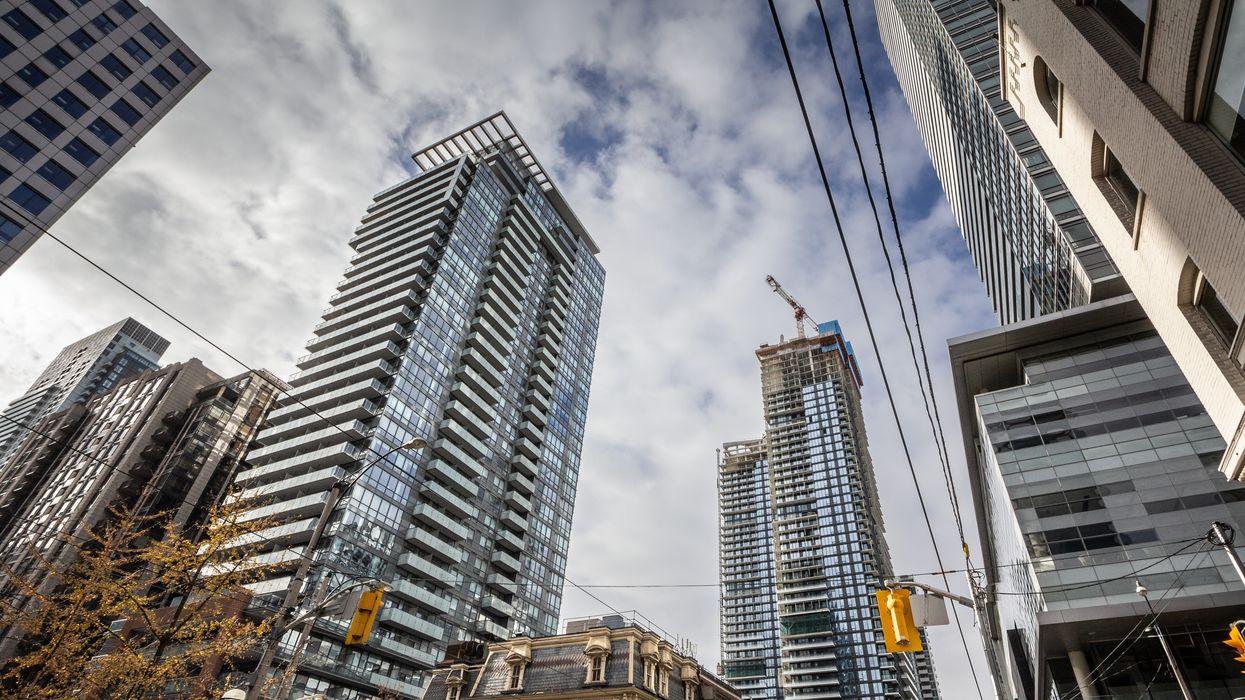In a typical year, the second quarter can be strong for new condo sales. But anyone who's been keeping a finger on the ebbing pulse of the Greater Toronto Hamilton Area's (GTHA) condo market won't be surprised to learn that Q2-2025 was not the slam dunk quarter some may have wanted.
According to Urbanation's Q2-2025 Condominium Market Survey, there were only 502 new condo sales recorded in the GTHA across the entire quarter. That's 10% below Q1-2025's sales, 69% below the year-ago level, and a remarkable 91% below the 10-year average.
GTHA new condominium sales peaked in Q4-2021 when sales clocked in at a staggering 10,257 transactions, before beginning their long descent to today's levels. This was due largely to the Bank of Canada raising interest rates 10 times between March 2022 and July 2023, increasing carrying costs for investors and reducing demand for what has increasingly become an oversaturated market.
Last quarter, the GTHA's crowded condo market saw a record high of 2,478 new condominium apartments completed, up 102% annually and five times the amount delivered three years ago. Meanwhile, sales by developers in completed new condo projects totalled a mere 131 units last quarter, bringing standing inventory levels to 60 months of supply. This indicates the amount of time it would take for the market to absorb the available inventory, taking into consideration the current level of demand. Generally, anything above five months of inventory suggests buyers’ territory in Toronto.
With sales continually hitting record lows and inventory at record highs, the collapsing condo market is beginning to take construction, jobs, and capital down with it.
Unsold inventory did decline 3% in Q2 — the first annual decline reported in more than three years — but Urbanation explains that this was due to developers pausing new condo launches and cancelling projects. According to their data, only three projects totalling 891 units launched for presales in Q2 and four projects totalling 719 units were cancelled. Since 2024, 20 projects and 4,360 units have now been cancelled, and nine are being converted to rental.
Meanwhile, May housing starts data from the Canada Mortgage and Housing Corporation (CMHC) revealed that Toronto weighed down national growth with its 22% year-over-year decline in housing starts, driven largely by a decline in multi-unit starts, and a June report from Altus Group found that the GTA is on track to see a 50% loss of construction jobs by 2029, while construction investment would fall by more than $10 billion.
“The market has entered a phase of the downturn that is really starting to wreak havoc," said Shaun Hildebrand, President of Urbanation. "Project cancellations are mounting, construction starts are collapsing, jobs are being lost, buyers are losing a lot of money, and developers are facing difficulties with closings. While a reduction to deliveries next year should help to alleviate some pressure, the near-term will remain very challenging.”
The alleviation Hildebrand speaks of will come with a return to more "historically normal" levels in 2026 as condo completions fall from the expected record-high of 31,422 units in 2025 back down to 18,037 units. Completions are then expected to continue declining after 2026 due to the "drop-off" in construction currently brewing. With conditions less than ideal, the GTHA saw 1,276 unit starts in Q2-2025, down 57% from a year ago and 84% compared to two years ago when there were 105,864 units under construction.
On the price front, asking prices for developer-held condos are on the decline, with the average price falling 6% year over year and 16% from the market high of two years ago to $1,212 per square foot (psf) last quarter. As for pre-sold condos that reached occupancy in Q2-2025, they sold for an average price of $1,187 psf, while resale condos within new buildings averaged $903 psf, meaning current market values for newly completed units are already lower than what investors paid for them.
In a June interview with STOREYS, Hildebrand explained the downsides to this discrepancy for investors. "As resale condo prices decline, it makes new condos, which are generally priced above resale units, less competitive and reduces their attractiveness to buyers,” he said. ”It also creates complications for buyers who pre-purchased units that are reaching closing. If resale prices are declining, new condo units may not be worth their contracted price, so there may be issues with obtaining a mortgage.”





















